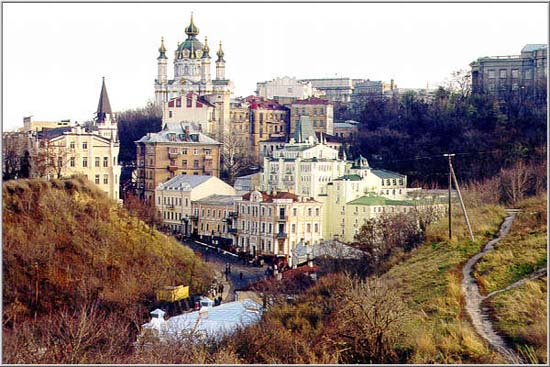
After the Russia-backed Yanukovych reportedly won the 2004 election, millions of Ukrainians rallied in the streets of Kiev in the Orange Revolution and refused to accept the results. This nonviolent movement swept Viktor Yushchenko, who narrowly survived a chemical poisoning assassination attempt, to power. Yushchenko was named president, Tymoshenko prime minister, and the dawn of a new day of government accountability and democracy was declared in the former Soviet republic of Ukraine. Only it hasn't happened. Six years later, talk of reform and anti-corruption has gone stale. Nobody wears orange anymore. The administration not only failed to bring several high-profile cases to a close, including the beheading of journalist Georgiy Gongadze in 2000, but also has left the country running in the red. Eighteen years after declaring itself an independent democracy, Ukraine is struggling. This is due largely to a fundamental misunderstanding of democracy. Schools are barred from failing students in what was described to me by educators as a "democratic principle of freedom." When communism was defeated, classroom consequences went from corporal punishment and public shaming to Ö nothing. Tatiana, an English teacher, lamented the lack of discipline in Ukrainian classrooms to me this way. "It is your democracy, I'm sorry to say, that created this problem," she said, wringing her hands.
RPCV Claire St. Amant writes: With Ukraine vote today, Ďan allergy to politics'
With Ukraine vote today, Ďan allergy to politics'
By CLAIRE ST. AMANT
HOUSTON CHRONICLE
Feb. 6, 2010, 5:06PM
It's a Saturday afternoon in Ukraine, and I'm making cabbage rolls with my friend Svitlana and her neighbor Natalya. Talk moves from the weather to the upcoming Easter holidays and finally rests on politics.
Natalya invites Svitlana to a rally for a new, young presidential candidate. Very seriously, Svitlana replies, "Oh, I can't make it. I have an allergy to politics."
Today, Ukraine will have a runoff election for president. The two candidates, Viktor Yanukovych and Yulia Tymoshenko, have aligned themselves respectively with the East and the West. However, in a marked shift from the 2004 election, both candidates want closer ties to Russia.
After the Russia-backed Yanukovych reportedly won the 2004 election, millions of Ukrainians rallied in the streets of Kiev in the Orange Revolution and refused to accept the results. This nonviolent movement swept Viktor Yushchenko, who narrowly survived a chemical poisoning assassination attempt, to power. Yushchenko was named president, Tymoshenko prime minister, and the dawn of a new day of government accountability and democracy was declared in the former Soviet republic of Ukraine. Only it hasn't happened. Six years later, talk of reform and anti-corruption has gone stale. Nobody wears orange anymore.
The administration not only failed to bring several high-profile cases to a close, including the beheading of journalist Georgiy Gongadze in 2000, but also has left the country running in the red.
Eighteen years after declaring itself an independent democracy, Ukraine is struggling. This is due largely to a fundamental misunderstanding of democracy. Schools are barred from failing students in what was described to me by educators as a "democratic principle of freedom." When communism was defeated, classroom consequences went from corporal punishment and public shaming to Ö nothing. Tatiana, an English teacher, lamented the lack of discipline in Ukrainian classrooms to me this way. "It is your democracy, I'm sorry to say, that created this problem," she said, wringing her hands.
My democracy? I certainly didn't recognize it. American democracy supports equal rights, not equal results.
While institutions such as the press have advanced in the years of independence, others have faltered. Health care workers and educators are still paid a fixed state salary. Oleh, a surgeon, makes roughly the same salary as a teacher. The first time I ate dinner with him and his wife, they peppered me with questions.
What were the houses like in the U.S.? Did I have a car? What did I know about Ukraine? And finally, what was a surgeon's salary in America? I mumbled something about private businesses and competition before sputtering out, "several hundred thousand dollars, more depending on location and specialty." The interrogation wasn't finished. Oleh, a specialist, wanted more economic information.
Ukrainian salaries are remarkably low, but prices are not. "We get Ukrainian salaries and American prices," Svitlana would remark with frustration.
And it was true. A T-shirt costs about $10 and around 100 hryvnia (the Ukraine currency, or UAH). Using the 8:1 exchange rate, they were comparable. But 100 UAH is about 10 percent of Svitlana's monthly salary as an English teacher.
In light of such bleak earning potential, it's not surprising that the most promising career move for a Ukrainian is to leave the country.
Oleh would frequently joke, "I want to go to America again." Have you been before? "No, but I've wanted to go before."
He would speak wistfully of driving a taxi or cleaning office buildings abroad. And this is a man with a deep passion for surgery, a man who spent his free time researching new methods, writing papers and even taking on a second job as a professor at the medical college. Ukraine needs people like Oleh, but it is losing them every day. The population of Ukraine has shrunk by 3 million in the last eight years, from 48 million in 2001 to 45 million in 2009, according to the State Statistic Committee of Ukraine. Only highly educated Ukrainians can find work abroad, which means its brightest citizens are on the way out and have been for some time.
Many Ukrainians are left doubting whether this so-called democracy is good for them. I'm not too sure myself. This perversion of democracy seems to negate its best aspects.
St. Amant, a Baylor University graduate from Katy, was a Peace Corps volunteer in Ukraine.












